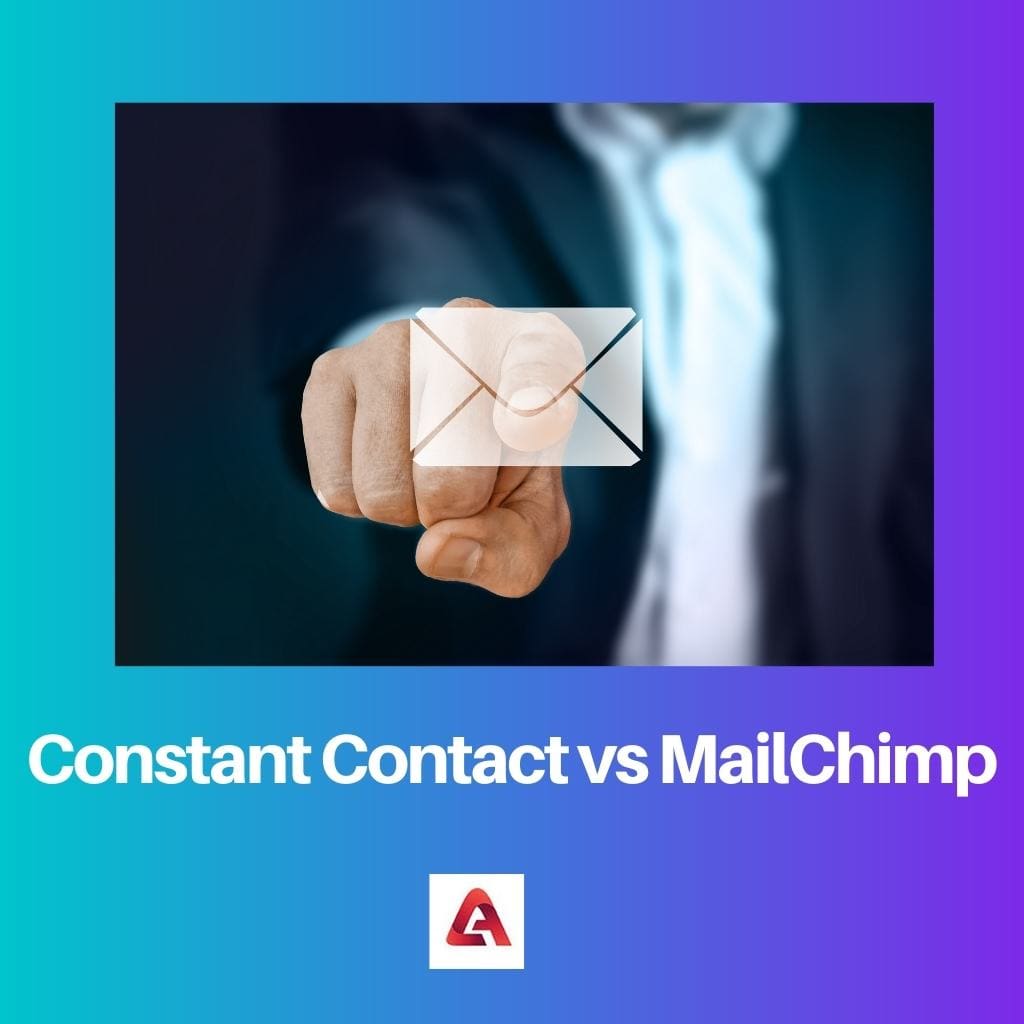Email marketing is cost-effective and a good marketing strategy for a small business to grow. The United States, on average, sees a 4300 per cent return on investment(RTO) for businesses.
Email marketing is easy to manage, allows you to make direct contact with your clients, and gives you full control.
It is important to understand that a big part of your success depends on email marketing. Choosing a good email marketing software is the most important task.
It should be efficient while taking the responsibility of ensuring that your emails get delivered. Constant Contact and MailChimp are two such software.
Key Takeaways
- Constant Contact offers an easier-to-use interface with a simple email editor, while Mailchimp offers a more complex interface with advanced marketing tools.
- Constant Contact offers more live customer support options, including phone and chat support, while Mailchimp offers support mainly through email and online resources.
- Constant Contact’s pricing is based on the number of contacts. In contrast, Mailchimp’s pricing is based on the number of subscribers, which may result in a more affordable option for smaller businesses.
Constant Contact vs MailChimp
Constant Contact charges based on the number of contacts in your email list and have a more traditional and straightforward interface. Mailchimp’s pricing is based on the number of subscribers and emails sent per month, and the interface is more modern, intuitive and user-friendly.

Comparison Table
| Parameter of Comparison | Constant Contact | MailChimp |
|---|---|---|
| Email Marketing Features | Constant Contact has a fantastic set of features like autoresponders, adding surveys, and coupons. | MailChimp has powerful features like campaigns triggered by segment and email sequences. However, it does not offer a proper workflow view. |
| Design and Flexibility | Constant Contact provides a decent set of stylish and necessary templates. There are 100 templates available. | MailChimp also provides 80 templates which is lesser than Constant Contact. However, these templates are quite impressive. |
| Price | Constant Contact offers a free trial of 30 days, after which you get unlimited emails by just providing your credit card information. | MailChimp has even better plans than Constant Contact. The plans are very flexible for different customers according to their needs. |
| User Interface | Constant Contact has a pretty impressive and user-friendly interface but gives a little less satisfaction than MailChimp. | MailChimp has a very elegant and simple designed interface. Even if you visit MailChimp for the first time, you won’t feel like that. |
| Deliverability | Constant Contact email deliverability is around 97 per cent, which is very effective. | MailChimp has a deliverability of around 96 per cent, which is good but slightly lesser than Constant Contact. |
| Customer Support | Constant Contact offers phone and chat support during business hours. However, these are not quite active. | MailChimp has 24/7 email customer support and chat help only for business hours. The support team is much more active and responsive than Constant Contact. |
What is Constant Contact?
Constant Contact is one of the world’s most widely used marketing services. It is the fastest-growing email marketing software and is a highly beginner-friendly service provider. Customers can easily contact our email templates and marketing calendars and manage the email lists.
It has amazing customer support with live chats, email community support, and a vast library of highly helpful resources. Aside from online training, Constant Contact also provides in-person live seminars.
Through this, small business owners quickly learn the fundamentals of email marketing, which results in the growth of their businesses with advanced strategies.

What is MailChimp?
MailChimp is a premium email marketing service. It provides performance reports, offers easy-to-use templates, social sharing, mobile apps, surveys, and a lot more. MailChimp is quite popular due to its clean, intuitive, and affordable services.
It is highly compatible with different software and has 2-way compatibility with Google Forms, Sheets databases, and Salesforce.
Recently, MailChimp has started offering advanced features. However, these are not truly advanced, as reported by many customers. Customer support is restricted to emails and chats only. However, support is highly active and responsive.

Main Differences Between Constant Contact and MailChimp
- Constant Contact, as well as MailChimp, has a powerful set of features like surveys, coupons, and campaigns. However, MailChimp does not offer a proper workflow view.
- Constant Contact offers a decent set of necessary templates, which are a hundred in number. On the other hand, MailChimp offers eighty templates which are a little less than constant contact.
- Constant Contact provides a 30-day free trial, after which you can get unlimited emails by offering your credit card information. Mailchimp has even more amazing plans than Constant Contact. The provided plans are extremely flexible according to different customers.
- The deliverability that is found in Constant Contact is around 97% which is very effective. On the other hand, MailChimp has a deliverability of around 96%. Both have impressive deliverability; however, MailChimp lags a little here.
- Constant Contact provides phone and chat support only applicable for business hours, whereas MailChimp has 24/7 email customer support and chat help. It was found that MailChimp is a lot more active and responsive as compared to Constant Contact, with a late reply.

The comparison between Constant Contact and MailChimp was outlined in a factual and articulate manner, offering valuable insights to readers.
It indeed delivered an in-depth comparison of both platforms, presenting the information in an engaging manner.
Indeed, Jacob Smith. The article’s detailed information on the pricing and email marketing features was particularly commendable.
The article effectively articulated the fundamental differences between Constant Contact and MailChimp, albeit in a slightly dry tone.
I concur, Rosie66. A more engaging tone in the writing would have enhanced the reader’s interest.
The article offered an unbiased comparison, but it would have been beneficial to include a section on the integration capabilities of these platforms.
You make a valid point, Cox Mohammed. Inclusion of platform integrations would have added another layer of depth.
The article has a strong analytical approach that effectively presents the differences between Constant Contact and MailChimp.
Definitely, Thomas Dave. The article’s comparison table is particularly beneficial for business owners.
It’s quite a refreshing take on the comparison between Constant Contact and MailChimp, providing a detailed evaluation of their features.
This article was informative and backed by statistical data, providing a reliable guide for businesses looking to choose between Constant Contact and MailChimp.
Absolutely, Mike07. The statistical analysis allowed for a more objective understanding of the platforms’ performance.
The straightforward comparison of pricing and features of both platforms allowed for a clear evaluation for potential customers.
Indeed, Allen Rebecca. The article’s comparison of user interface and customer support was particularly insightful.
This article provides a comprehensive comparison between Constant Contact and MailChimp, which is very useful for businesses who are considering the best email marketing software. Great information!
I agree, Fiona15. However, it could benefit from more statistical data to reinforce the point.
The article presented a fair comparison of both platforms, highlighting their key features and differences effectively. Quite an interesting read.
It certainly was. However, I would be very interested in seeing a future article on other email marketing platforms as well.
The comparison between Constant Contact and MailChimp was informative, but it would be useful to have more personal insights and experiences included in the article.
I get your point, Ngray. Adding real examples of businesses using these tools would add more depth to the comparison.
This article barely scratches the surface of the email marketing discussion. I expected more in-depth analysis and a wider range of comparisons.
Gentlemen, it’s quite plausible that the article aimed to provide an introductory comparison of two popular platforms, rather than an extensive review.
I understand your point, Cameron71. More thorough research on various email marketing services would have presented a more holistic view.